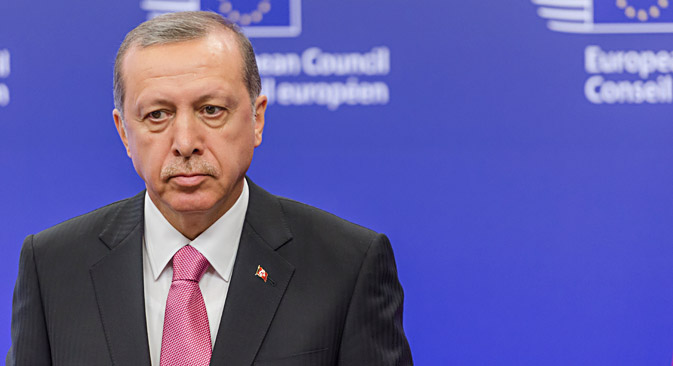
Turkish President Recep Tayyip Erdogan. Source: ZUMA/TASS
Zuma\TASSThe recent incident in which Russian aircraft violated Turkish airspace has angered Turkish President Recep Tayyip Erdogan, the independent news website Svobodnaya Pressa reports.
He said on Oct. 6 that Moscow might "lose such a friend" as Ankara and made it clear that Russia's actions could be regarded as an attack on his country. NATO, of which Turkey is a member, fully supported the country’s position.
Confirming the fact of the inadvertent violations – a Russian Su-30 fighter penetrated Turkish airspace for just a few seconds – the official representative of the Russian Defense Ministry, Major-General Igor Konashenkov, urged not to seek "conspiracy reasons" in the situation, which he said was the result of unfavorable weather conditions. But in the West this explanation fell on deaf ears.
Mikhail Alexandrov, a leading expert of the Center for Military and Political Studies at the Moscow State Institute of International Relations, believes that Turkey is seeking to restrict the actions of the Russian air force.
"I think our military aircraft that fly close to the Turkish border – for instance, in Armenia – could have inadvertently entered Turkish airspace before, too," he said.
"But no one made large-scale scandals out of it, even more so with the involvement of NATO. Now they have, and it's only because Ankara is very dissatisfied with our policy on the Syrian track.
"Turkey expects, in my opinion, to occupy part of Syrian territory in the region of Aleppo to control the Syrian Kurds. Ankara fears that if the Kurds in Syria receive autonomy, the Kurds on Turkish territory will require the same.
"In addition, Turkey wants to involve NATO and the EU in the Syrian conflict as much as possible; ideally, to get new sanctions imposed on Russia by Europe."
The frontman of the U.S. rock band Limp Bizkit, Fred Durst, has written a letter to the administration of Crimea, the centrist daily Izvestiya reports.
As stated in the letter, if the musician received a Russian passport, he would film movies and TV series on the peninsula, which would bring Russia "to a high level in this business," while he would eventually become "part of the great future of Crimea and Russia.”
Durst wrote that "would be happy" if he had a Russian passport and a "pretty little house in Crimea."
Earlier, the Crimean authorities called on celebrities to come to live in Crimea, and promised to help organize an equivalent of Beverly Hills on the peninsula.
As Durst told Izvestiya, if Crimea indeed starts to build an equivalent of Beverly Hills, he guarantees that "other creative Americans from the film industry and show business" will follow him there.
Crimea's Resort and Tourism Minister Sergei Strelbitsky said that the administration is waiting for Durst in Crimea to discuss the details.
"It's great that Durst is ready to develop our brand," he said.
"First we need to invite him to Crimea, since he has expressed a desire to work with the authorities of Crimea and even to live here for a while. We invite him!" said Strelbitsky.
Russian regulators' attempts to force foreign shareholders of domestic companies to disclose information about themselves have been met with strong opposition, the business daily Kommersant reports. Owners are refusing to comply with new legal provisions requiring disclosure.
Such is the requirement of the new law 210-FZ, which has partly entered into force, but will be in full operation only from July 2016.
According to the law, Russian companies must disclose and update information about all real shareholders. However, it has proved not so easy to fulfill the new rules.
"There is a law on the protection of personal data," said Dmitry Krupyshev, managing partner of law firm LECAP.
"If the Russian nominal holder can be obliged to disclose the final beneficiary, the American one cannot, as the law follows territorial principle."
As a result, all participants in the process are faced with risks, say experts. Shadow shareholders are deprived of the right to vote and run the risk of not receiving dividends, the making of important decisions gets stalled at issuing companies, and the responsibility for the situation lies on Russian registrars in the form of fines and other sanctions.
All rights reserved by Rossiyskaya Gazeta.
Subscribe
to our newsletter!
Get the week's best stories straight to your inbox